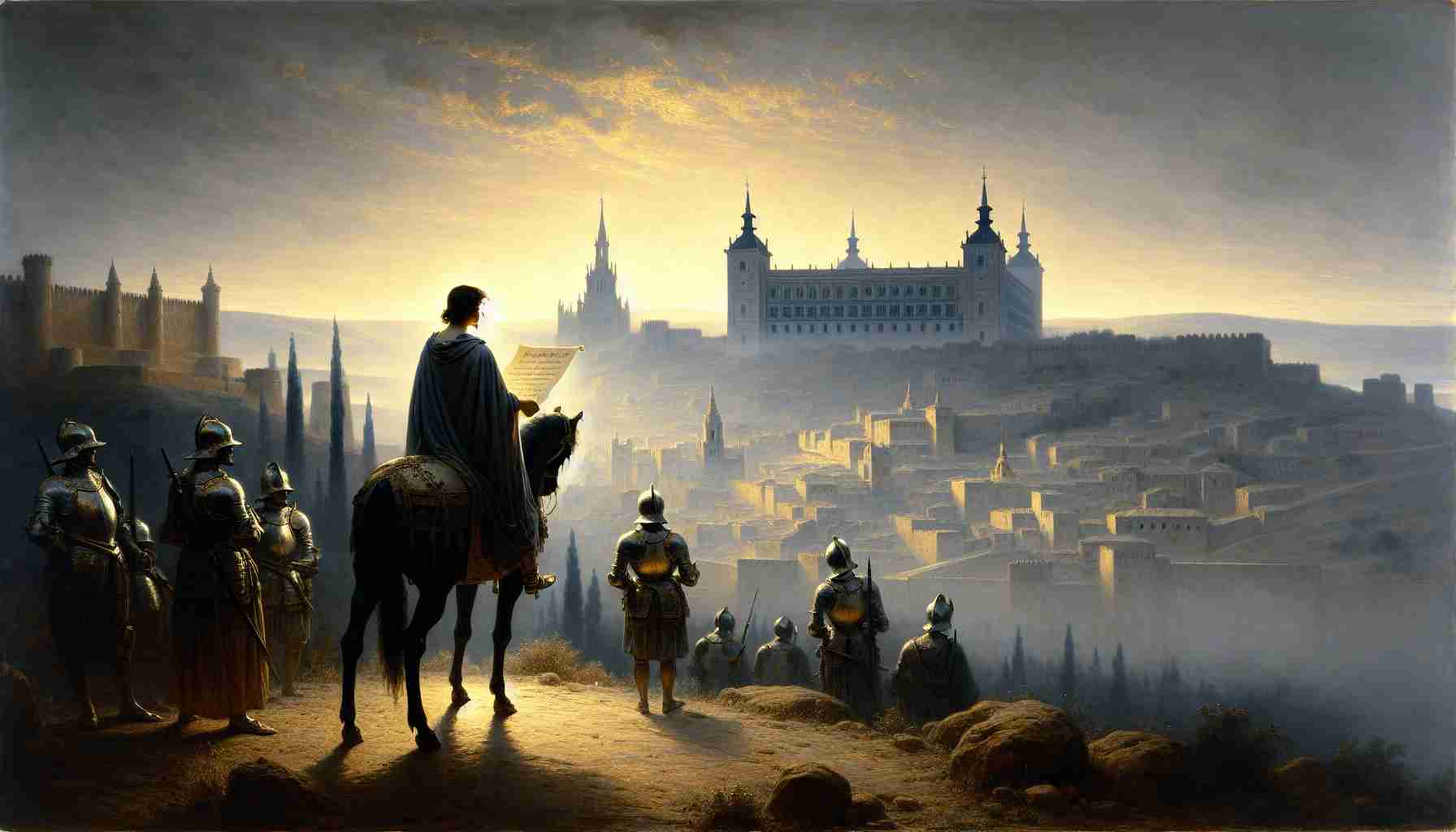

The sun had not yet risen, but the valley below Toledo stirred like a restless sea. Smoke curled in the dim light, trailing from the campfires of Castile’s weary soldiers. Steel clinked and murmurs rose like prayer as King Alfonso VI stood before his commanders. Clad in mail dulled by travel, his eyes fixed on the city ahead—Toledo, the heart of old Visigothic Spain, now held by the Moors for over three centuries.
His breath curled in the morning chill. In his hand, a parchment stained from travel—Joshua 1:9 inked in firm script: “Be strong and courageous. Do not be afraid; do not be discouraged, for the Lord your God will be with you wherever you go.”
The fortress walls of Toledo loomed over the Tagus River, a bastion of stone grown wild with Muslim splendor—minarets called to prayer from towers once crowned with crosses. Yet within those walls lay churches buried beneath centuries of silence, their altars long hidden beneath the weight of conquest. Alfonso’s mission was not only war, but resurrection.
Three days past, the Taifa king al-Qadir had petitioned. With Toledo beset by Berber mercenaries and enemies near the throne, he offered the city in nominal surrender. But Alfonso knew such a conquest—peaceful or not—would stir hornets. Muslim chroniclers whispered dismay. Christian lords watched with envy.
Still, he pressed on.
The gates fell not with the force of blade, but through shrewd leverage. Alfonso’s horse clattered atop the cobblestones as he entered the city that May morning, the banner of Christ borne behind him. Bells long silent rang again from San Roman's belfry as citizens peered from shuttered windows, uncertain whether liberation or ruin had come to call.
He rode not with the clangor of pillage, but a solemnity reserved for sacred rite. At the Mezquita Mayor, once the Visigothic Church of Saint Mary, Alfonso dismounted. Soldiers stepped back in hush as the king entered the mosque. He looked upon the mihrab carved into southern stone, its calligraphic prayers to Allah still vivid. Without bitterness, he crossed the marble floor to the apse—its shape betraying the church it had once been.
There, he knelt.
Let the world wage war as it pleased. Alfonso had come to reclaim not land, but legacy.
In the days that followed, edicts spread like fire across the city. Churches were restored, mosaics uncovered from beneath lime plaster. The Council of Toledo convened once again, just as it had in the days before Arab conquest. Yet Alfonso offered more than mere conquest—he offered unity. Mozarabic Christians, who had preserved Latin tongues under Muslim rule, now worshiped openly. The king ordered both rites—the Latin Roman and the Mozarabic—to be kept, their chants filling the same stone halls.
Rome balked. Papal envoys demanded uniformity. Alfonso stood firm.
“To crush that which has endured,” he said to the Archbishop Bernard, “would be to crush Spain’s soul.”
Among the Jews of Toledo, too, there was cautious hope. Though their fate was never secure under any crown, Alfonso’s laws offered certain liberties. In this city flickered a fragile harmony—Arabic poets, Latin scribes, Hebrew philosophers. A crucible, not of division, but of brilliance.
Yet clouds gathered beyond Toledo’s gates.
In the distant south, the almorávides plotted. Berber, pious, and iron-bound, they decried Alfonso’s conquest and al-Qadir’s surrender as betrayal of Islam. The Reconquista had stained the caliphate, and they sought vengeance.
Alfonso knew the storm would come. He fortified the city, summoned allies, and trained his sons in arms. But each morning he returned to Saint Mary’s, the once-mosque now reclaimed as a cathedral. Beneath the carved arch of the nave, he bent his knee—not to the crown, nor to war, but to the Word.
He read again from Joshua: “Be strong and courageous…”
Others saw battle in lands and armies. He saw it in the soul of his nation.
And slowly, Spain awakened. From Pamplona to León, Christian lords hardened their resolve. Toledo, no longer a lost gem, now shone as a beacon. Students and clerics gathered in its revived schools, rekindling knowledge lost since Rome’s fall. Alfonso’s court brimmed with translators. Arabic works of science and Greek philosophy, long preserved by Muslim scholars, were rendered into Latin. To reclaim Toledo had not only recovered a city—it had ignited an age.
But the king withheld triumph. For every bastion rewon, others still lay in shadow. His warriors sang of glory; Alfonso sang psalms.
He died with sword in reach and scripture in hand. Not in Toledo, but far from it—on the plains of the Duero, where his heirs would carry his standard forward. Yet his greatest conquest remained the city where churches rose again, voices sang in mingled tongues, and faith found roots beneath centuries of sand.
Toledo stood, golden on the hill, not as a spoil of war, but as a testament: that what is lost can be redeemed—not by sword alone, but by steadfast hearts who walk where God leads them.
“Do not be discouraged,” the verse still whispered in the wind between cathedral walls and quiet chapels, “for the Lord your God will be with you wherever you go.”